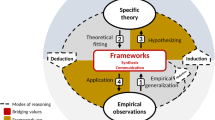Abstract
Impostors are pseudo-problems masquerading as genuine problems. Impostors should be exposed. The problem of change appears genuine. But some, such as Hofweber (2009) and Rychter (2009), have recently denounced it as an impostor. They allege that it is mysterious how to answer the meta-problem of saying what problem it is: for even if any problem is genuinely about change per se, they argue, it is either empirical or trivially dissolved by conceptual analysis. There is indeed an impostor in our midst. But it is the meta-problem of change. I defend the appearance that the problem of change is a genuine metaphysical problem about change. This vindicates philosophers’ lasting interest in it. It also illuminates what makes a problem metaphysical, how metaphysics relates to other inquiries, and how best to respond to attempts to undermine metaphysical problems.
Similar content being viewed by others
Notes
Hofweber’s own method is inconsistent. At one point Hofweber (2009, p. 290) rejects the top-down method; but elsewhere Hofweber (2009, p. 287) uses the top-down method by assuming that a problem is metaphysical only if it modestly respects science’s authority and then rejecting a formulation of the problem of change because it does not satisfy this constraint. This methodological inconsistency is not atypical among no-problemers.
See Haslanger (2003) for a detailed discussion of just how particular views about persistence are logically independent of, but nevertheless comport with, particular views about the tensed or tenseless nature of reality.
See Hinchliff (1996) for an influential example of this endurantist view.
See Sider (2001) for an influential example of this perdurantist view.
To demand that an answer to the meta-problem of change must answer these questions is to adopt a strong version of the top-down method rejected by Hofweber and Rychter. Indeed, everyone should reject this demand. We needn’t settle on a view of the whole of metaphysics prior to settling on a view of one of its component problems.
See Sect. 2.1 of Hofweber (2009).
Hofweber (2009, p. 287) agrees: “The empirical problem of saying why the candle got bent, or how it was possible that it changed its shape, even though no one touched it, has been solved.”
No-problemers might try to lessen the force of this second illustration by assuming that how things actually are is how they must be. But that is to make the argument for the Puzzle not being a metaphysical problem reliant upon a controversial metaphysical assumption.
Here I follow Hofweber (2009).
No-problemers overlook the tensed version of this question: “Why is it possible for the candle to have been straight and now bent, but not now both?”
It is no help to answer Question* with “Because the candle can be straight and bent at different times, but not both at the same time”. For that circularly answers Question, but Question* just restates Question.
Wasserman (2006) raises this same objection.
Indeed, the need is apparently rejected by standard views about persistence through change such as perdurantism and stage theory. By leaving these views off the table, no-problemers once again take without argument a controversial metaphysical stand in the course of an argument that there is no metaphysical problem of change.
C.f. Schiffer (2003).
C.f. Williamson (1994).
C.f. Williams (2008).
References
Descartes, R. (1996). Meditations on first philosophy (J. Cottingham, Trans., J. Cottingham, Ed.). Cambridge: Cambridge University Press.
Fine, K. (1975). Vagueness, truth, and logic. Synthese, 30, 265–300.
Fine, K. (2005). “Tense and reality”. In modality and tense: philosophical papers. Oxford: Clarendon Press.
Haslanger, S. (2003). Persistence through time. In M. J. Loux & D. W. Zimmerman (Eds.), The Oxford handbook of metaphysics. Oxford: Oxford University Press.
Hinchliff, M. (1996). The Puzzle of change. Philosophical Perspectives, 10, 119–136.
Hofweber, T. (2009). The meta-problem of change. Nous, 43(2), 286–314.
Kurtz, R. M. (2006). Introduction to persistence: What’s the problem? In S. Haslanger & R. M. Kurtz (Eds.), Persistence: Contemporary readings. Cambridge, MA: Bradford Books.
Lewis, D. (1986). On the plurality of worlds. Oxford: Blackwell Publishers.
Mellor, D. H. (1998). Real time II. London: Routledge.
Prior, A. N. (2003). Papers on time and tense (P. Hasle, P. Ohrstrom, T. Brauner, &J. Copeland, Eds.). Oxford: Oxford University Press.
Rychter, P. (2009). There is no Puzzle about change. Dialectica, 63(1), 7–22.
Schiffer, S. (2003). The things we mean. Oxford: Oxford University Press.
Sider, T. (2001). Four-dimensionalism. Oxford: Oxford University Press.
Unger, P. (2006). All the power in the world. Oxford: Oxford University Press.
Wasserman, R. (2006). The problem of change. Philosophy Compass, 1(1), 48–57.
Williams, J. R. G. (2008). Ontic vagueness and metaphysical indeterminacy. Philosophy Compass, 3, 763–788.
Williamson, T. (1994). Vagueness. London: Routledge.
Acknowledgments
Thanks to Margaret Cameron, Anna-Sara Malmgren, Colin Marshall, Ryan Robinson, Ted Sider, Jonathan Simon, Peter Unger, Audrey Yap, the University of Victoria students in my fall 2009 seminar “Time, Tense, Change, and Persistence”, the audience of the 2010 Western Canadian Undergraduate Philosophy Conference held at the University of Victoria, and an anonymous referee for helpful comments. I am also indebted to Kit Fine and Mark Hinchliff for influencing the general picture of metaphysics sketched in Sect. 5, along with its particular application to the problem of change.
Author information
Authors and Affiliations
Corresponding author
Rights and permissions
About this article
Cite this article
Raven, M.J. There is a problem of change. Philos Stud 155, 23–35 (2011). https://doi.org/10.1007/s11098-010-9564-6
Published:
Issue Date:
DOI: https://doi.org/10.1007/s11098-010-9564-6




